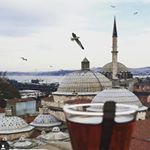You have no items in your cart. Want to get some nice things?
Go shoppingI need to buy tea.
I land at the Okęcie airport in Warsaw. From the front of my ginger coat I brush off the crumbs of a “Prince Polo” bar, a bite of Polishness, which the airline served us just before landing. “Prince Polo”, the taste of my childhood, brings back the memory of the voice of my grandmother. To buy the bars, grandma had to stand in long queues. As she had to for everything in that Poland, which one was not allowed to leave. The Okęcie airport served mainly communist officials, they used it for trips to “brotherly countries” (a favourite propaganda term).
Until one day my grandma took off from it too. It was a trip to Sweden and Britain organised for former prisoners of the Auschwitz concentration camp. I waved to her from the airport terrace, the roar of the engines buzzing in my stomach. The plane tiptoed along the runway like a ballerina from the Bolshoi Theatre, began to glide, accelerate, and offfffff it went…
Tea I need to buy.
My coat absorbed the impersonal smell of the plane’s air conditioning system, even though the flight between Brussels and Warsaw took less than two hours. I bought the coat in Stockholm. When I moved there 15 years ago, my grandmother said: “It is quiet there, safe, good for children”. About Britain, she said: “They have these little houses there”. “Like the ones I used to draw when I was a kid?” I asked.
Before we moved into a concrete bloc of flats, we used to live in a house called a Finnish house. A compound of these yellow houses was built in the Warsaw quarter of Ochota by the Russians, it was a gift from a brotherly nation. Ochota is close to the Okęcie airport, but I do not recall planes flying overhead. I only remember the one that grandma took.
To buy tea I need
I was wrong. I open the cupboard in my Warsaw home and I see – there is tea! I forgot I run out of it in my Brussels home. Polish tea is strong, its called Yunan, I have been drinking it since childhood. A tea-drinkers house – that’s the house of my childhood. We, from eastern Europe, drank coffee only in the office. At home we drank tea – for sorrow, for a stomach ache, for a hangover, or to welcome guests. Dregs of tea leaves bulging at the bottom of a glass – in our home tea was served in glasses – were the foundation of everyday life. “Shall I make you some tea?” grandma would ask rhetorically when I returned from school. “Forget it, she can make it herself,” my mother would admonish her. But grandma was already putting glasses on the kitchen counter, lighting up the stove, heating up the water in a kettle with a whistle and putting dried tea leaves into a brown steamer.
In Belgium, tea is called an “ïnfusion”. It is a slap in the face for my tea-drinker’s identity. In my Brussels home, we drink tea brought from Poland or from Britain — countries of small houses.
When I am I Poland, they sometimes ask me if I miss my country – the Polish language has retained the rhetoric of political emigration, the ethos of exile and inconsolable longing. I bite my tongue. Should I admit that if I miss anything it is Brussels, the “ïnfusion” city, the capital of a country without a clear national identity? After leaving Poland more than a dozen years ago my patriotic needs are met by cities: by Brussels and by Warsaw. I supply both my homes with strong black tea.
Je dois acheter un thé
Brussels is freedom, even though French syntax constrains me in the same way as English. Subject, verb, there is no escaping that order. Polish with its declinations, inversion, is for us, it users, like a dolphinarium. We twist nouns, play with verbs, toy with adjectives.
Un thé je dois acheter
Again at the Okęcie airport. “What are you carrying here, marihuana?” jokes the Polish customs officer checking my hand luggage. Boxes with “Yunan” tea are factory sealed, but one is open. I could have left it in my Warsaw home, but I grabbed it at the last moment and squeezed it into the bag I am taking to Brussels. Twisted, dried tea leaves rustle in the hands of the customs officer, who shakes the box like a baby rattle.
The officer is not much older than twenty, he cannot remember the lines for food, probably drinks latte, a macchiato or a cappuccino at home. He can probably afford an expresso machine advertised by George Clooney. I look for the smile of the actor from the advertisement, but all I see is the face of the customs officer. He smiles knowingly and lets me deeper inside the Warsaw airport. I begin to imbibe its impersonal smell. Okęcie – big, reconstructed, modern – is an airport for all citizens, not just the communist bigwigs. People mill around among shelves heavy with colourful goods, stifling boredom.
Powinnam kupić herbatę.
Herbatę kupić powinnam.
Kupić herbatę powinnam.
Tout est possible. Everything is possible. Wszystko jest możliwe. The syntax of my native language gives freedom. You can juggle it without risking ridicule. Play with it, twist it, fly. Fly.
I walk through the “sleeve” to the plane, leaving behind me the airport building. I turn around and look. I see the old, concrete block, in the past guarded by soldiers in dark green uniforms. When I was a teenager, the fashion craze was to wear a military coat. Everybody wanted to have a camouflage jacket, if not a real one, than at least a fake. We became crazy about military paraphernalia then.
I unbutton the ginger coat, show my ticket and board the plane. “We welcome you on board of our plane for our flight to Brussels…” the engines roar, the plane accelerates, its run becomes wobbly as if the take-off were to slip out of control. Now an announcement in French, the language of my adopted city: “Mes dames et monsieurs…” The phrases set according to western order, subject, verb… Their syntax puts a muzzle on Polish words still reverberating in my head.
The plane detaches itself from the tarmac and … offff it goes! I detach myself from history, from known names, the taste of “Prince Polo” and, among gentle turbulence, I fly towards my other homeliness – Brussels.
I get out at Zaventem airport. I quicken my pace to get rid of the impersonal smell, to finally leave the airport and soak up the adopted smell, the scent of nomadic freedom.
Suddenly I slow down. There are soldiers patrolling Zaventem, the dark colour of their uniforms contrasts with the florid colours of duty-free shops. Now soldiers are guarding my second country. I start going again, as far away from the airport as possible. The boxes with Polish tea rustle in the bag under my arm.

About Grażyna Plebanek
Grażyna Plebanek was born in Warsaw, Poland. She is the author of highly acclaimed and bestselling novels. Her novel Illegal Liaisons (Nielegalne związki, 2010) was sold in 52,000 copies in Poland and wa translated into English. Illegal Liaisons was published in the U.S. in 2013 by New Europe Books, distributed by Random House. She is a columnist of the prestigious weekly “Polityka”, as well as the monthly supplement of Poland’s biggest daily Gazeta Wyborcza, and the “Trends” magazine. In 2011 Plebanek was awarded the Literary Prize Zlote Sowy for her contribution to promoting Poland abroad. Plebanek is among a group of international artists whose portraits will be exhibited in Brussels Gare del’Ouest for the next 10 years. She lives in Brussels, Belgium. Recently, Ann Morgan listed "Illegal Liaisons" as the Polish novel worth reading in her collection of the world's literary works (TED Talk: My year reading a book from every country in the world) Plebanek’s new novel “Madame Fury” will be published this summer. It tells the story of how the main character is forced to navigate the complexities of identity for people living in two or more cultures. It is about manipulation and racism.






One comment